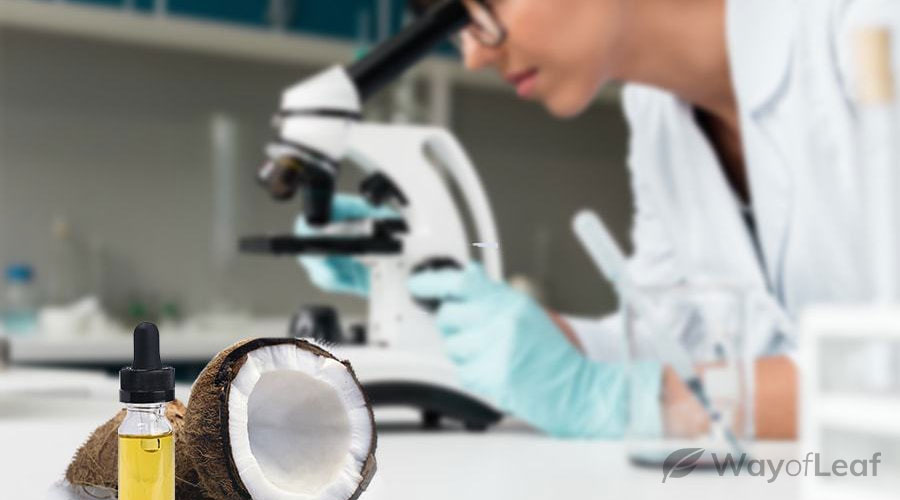If you’ve got a curious mind, as we do, you’ve likely wondered why we take CBD oil rather than just plain CBD by itself. If CBD is the only active therapeutic compound in a CBD product, why can’t we just swallow a spoonful of it and be done with it?
Well, the body doesn’t really work that way, unfortunately. In order to digest things properly and absorb minerals/nutrients for use, compounds must be broken down and absorbed through the intestinal wall.
While we can absorb CBD by itself, it is much more efficient (up to three times more efficient, in fact) when we ingest it along with a carrier oil. Since cannabinoids from the cannabis plant (like CBD and THC) are fat-soluble (meaning they dissolve in oil rather than water), infusing them in a saturated fat enhances their bioavailability drastically.
But why is CBD oil often made with coconut oil? We all know that hemp (where many CBD oils come from) produces a natural oil from its seeds, so why don’t we just use hemp seed oil instead? The answer comes down to lipids and how the human body absorbs them.
CBD + Coconut Oil = The Perfect Combination
Coconut oil is pretty much the perfect carrier oil for CBD because of its saturated fat content. The way that cannabinoids work molecularly is that the higher the lipid content of the oil they are in, the better and more efficiently they can absorb. Conveniently, coconut oil contains up to 90% saturated fat, as opposed to olive oil and hemp seed oil which only contain around 14% and 11% fat content, respectively.
These lipids come in forms of either medium-chained or long-chained triglycerides and the body transports each type differently through biochemical transporters. Medium-chain triglycerides absorb and break down quickly whereas long-chained triglycerides require certain enzymes to help absorption and breakdown.
Since the saturated fat content of coconut oil largely comprises medium-chain triglycerides (MCTs) instead of long-chain triglycerides (LGTs), you don’t need to be concerned about it clogging up your arteries.
In fact, coconut oil is one of the only natural oils that has a high content of MCTs. While these serve as an excellent energy source that is much easier to metabolize than complex carbohydrates or LCTs, they also act as an advantageous carrier for CBD.
Ultimately, the reason why most of the best CBD oils are made with coconut oil as opposed to hemp seed oil is because coconut oil has more saturated fat. Therefore, it can break down and carry more CBD molecules, and ultimately deliver more cannabidiol to our cells for absorption.
Without coconut oil, a large percentage of CBD molecules simply end up making their way to the liver, at which point they’d be treated as waste and simply excreted through urine. This is why you want to select a CBD tincture that uses coconut oil over olive oil or some other type of oil.
The Science Behind Coconut Oil and CBD
A few studies exist on why coconut oil acts as the molecular carrier of choice for CBD. While a lot of the scientific language can be pretty complex and confusing, what the research basically says is that when you ingest CBD in a high-fat oil (like coconut or pure MCT oil), you’re getting the maximum possible absorption.
Here’s how it works: lipids (the scientific word for fats) stick to the walls of whatever internal transport system they’re traveling through. Think about our blood vessels, for instance: you’ve heard of clogged arteries and plaque buildup that causes heart disease. Well, this is due in part to high amounts of bad fat in the system. These lipids stick to the artery walls and do not break down easily (metabolize), so they just sit there and accumulate.

Good saturated fats, on the other hand, actually absorb very quickly and easily directly through the intestinal wall. One type of good fat is medium-chain triglycerides (MCTs), like those that occur naturally in coconut oil.
Since lipids can absorb directly through the intestinal walls instead of passing through the entire digestive system, a fat-containing substance like coconut oil can maximize the bioavailability of CBD. Scientifically, this is referred to as intestinal lymphatic transport.
Lymphatic transport is crucial when taking certain medications (CBD included). It means these medications avoid the liver breaking them down. If CBD enters the liver, it metabolizes it into smaller components. At this point, it becomes less efficacious in terms of its therapeutic or pain-relieving potential.
On a side note, this is also why liposomal transport is used to deliver certain medications. It allows them to pass directly into cells through the gut lining. Some companies are already experimenting with CBD liposome capsules for maximum absorption.
Final Thoughts on Why CBD Is Made with Coconut Oil
To be clear, not all CBD oils are made with coconut oil. There are plenty out there that are infused in olive oils or natural hemp seed oils, and they do indeed work just fine – depending on how their manufacturers extract and process them.
All fat-containing oils, like coconut oil, provide for the maximum absorption rate of CBD into the body’s cells, by allowing it to pass directly through the intestinal wall instead of entering into the liver.
As you’ll find if you end up using CBD frequently, many of the best CBD oils and tinctures are infused in a quality coconut oil or MCT oil. However, just like with anything else related to your health and body, we encourage you to work with a cannabis-knowledgeable physician or PCP before trying any type of cannabis or CBD product.




![How Much Is in a Dime of Weed? [Cost + More!]](https://wayofleaf.com/wp-content/uploads/2019/04/mj_how-much-is-a-dime-of-weed-answered-640x225.jpg)
![What Is “Mids” Weed? [Explained for the Cannabis Rookie]](https://wayofleaf.com/wp-content/uploads/2018/11/what-is-mids-weed-explained-for-the-cannabis-rookie-640x225.jpg)


![Why Is CBD so Expensive? [The TRUTH Revealed…]](https://wayofleaf.com/wp-content/uploads/2018/07/mj_why-is-cbd-so-expensive_1920-640x225.jpg)
![Does CBD Interact with Other Medications? [Answered]](https://wayofleaf.com/wp-content/uploads/2018/05/wol_1920x450-73-640x225.jpg)
![How to Determine Which CBD Oil Potency Fits You [BEGINNERS GUIDE]](https://wayofleaf.com/wp-content/uploads/2019/03/wol_which-cbd-oil-potency-fits-you_1920x450-640x225.jpg)

